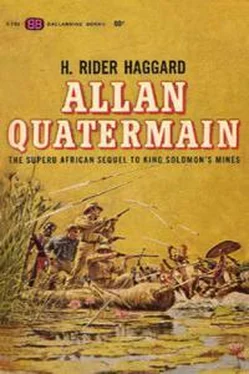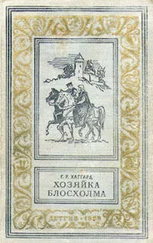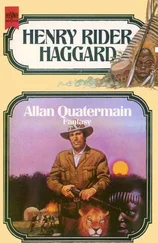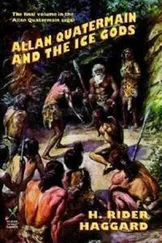The moon went down. For a long while she had been getting nearer and nearer to the horizon. Now she finally sank and left the world in darkness save for a faint grey tinge in the eastern sky that palely heralded the dawn.
Mr Mackenzie stood, watch in hand, his wife clinging to his arm and striving to stifle her sobs.
'Twenty minutes to four,' he said, 'it ought to be light enough to attack at twenty minutes past four. Captain Good had better be moving, he will want three or four minutes' start.'
Good gave one final polish to his eyeglass, nodded to us in a jocular sort of way—which I could not help feeling it must have cost him something to muster up—and, ever polite, took off his steel–lined cap to Mrs Mackenzie and started for his position at the head of the kraal, to reach which he had to make a detour by some paths known to the natives.
Just then one of the boys came in and reported that everybody in the Masai camp, with the exception of the two sentries who were walking up and down in front of the respective entrances, appeared to be fast asleep. Then the rest of us took the road. First came the guide, then Sir Henry, Umslopogaas, the Wakwafi Askari, and Mr Mackenzie's two mission natives armed with long spears and shields. I followed immediately after with Alphonse and five natives all armed with guns, and Mr Mackenzie brought up the rear with the six remaining natives.
The cattle kraal where the Masai were camped lay at the foot of the hill on which the house stood, or, roughly speaking, about eight hundred yards from the Mission buildings. The first five hundred yards of this distance we traversed quietly indeed, but at a good pace; after that we crept forward as silently as a leopard on his prey, gliding like ghosts from bush to bush and stone to stone. When I had gone a little way I chanced to look behind me, and saw the redoubtable Alphonse staggering along with white face and trembling knees, and his rifle, which was at full cock, pointed directly at the small of my back. Having halted and carefully put the rifle at 'safety', we started again, and all went well till we were within one hundred yards or so of the kraal, when his teeth began to chatter in the most aggressive way.
'If you don't stop that I will kill you,' I whispered savagely; for the idea of having all our lives sacrificed to a tooth–chattering cook was too much for me. I began to fear that he would betray us, and heartily wished we had left him behind.
'But, monsieur, I cannot help it,' he answered, 'it is the cold.'
Here was a dilemma, but fortunately I devised a plan. In the pocket of the coat I had on was a small piece of dirty rag that I had used some time before to clean a gun with. 'Put this in your mouth,' I whispered again, giving him the rag; 'and if I hear another sound you are a dead man.' I knew that that would stifle the clatter of his teeth. I must have looked as if I meant what I said, for he instantly obeyed me, and continued his journey in silence.
Then we crept on again.
At last we were within fifty yards of the kraal. Between us and it was an open space of sloping grass with only one mimosa bush and a couple of tussocks of a sort of thistle for cover. We were still hidden in fairly thick bush. It was beginning to grow light. The stars had paled and a sickly gleam played about the east and was reflected on the earth. We could see the outline of the kraal clearly enough, and could also make out the faint glimmer of the dying embers of the Masai camp–fires. We halted and watched, for the sentry we knew was posted at the opening. Presently he appeared, a fine tall fellow, walking idly up and down within five paces of the thorn–stopped entrance. We had hoped to catch him napping, but it was not to be. He seemed particularly wide awake. If we could not kill that man, and kill him silently, we were lost. There we crouched and watched him. Presently Umslopogaas, who was a few paces ahead of me, turned and made a sign, and next second I saw him go down on his stomach like a snake, and, taking an opportunity when the sentry's head was turned, begin to work his way through the grass without a sound.
The unconscious sentry commenced to hum a little tune, and Umslopogaas crept on. He reached the shelter of the mimosa bush unperceived and there waited. Still the sentry walked up and down. Presently he turned and looked over the wall into the camp. Instantly the human snake who was stalking him glided on ten yards and got behind one of the tussocks of the thistle–like plant, reaching it as the Elmoran turned again. As he did so his eye fell upon this patch of thistles, and it seemed to strike him that it did not look quite right. He advanced a pace towards it—halted, yawned, stooped down, picked up a little pebble and threw it at it. It hit Umslopogaas upon the head, luckily not upon the armour shirt. Had it done so the clink would have betrayed us. Luckily, too, the shirt was browned and not bright steel, which would certainly have been detected. Apparently satisfied that there was nothing wrong, he then gave over his investigations and contented himself with leaning on his spear and standing gazing idly at the tuft. For at least three minutes did he stand thus, plunged apparently in a gentle reverie, and there we lay in the last extremity of anxiety, expecting every moment that we should be discovered or that some untoward accident would happen. I could hear Alphonse's teeth going like anything on the oiled rag, and turning my head round made an awful face at him. But I am bound to state that my own heart was at much the same game as the Frenchman's castanets, while the perspiration was pouring from my body, causing the wash–leather–lined shirt to stick to me unpleasantly, and altogether I was in the pitiable state known by schoolboys as a 'blue fright'.
At last the ordeal came to an end. The sentry glanced at the east, and appeared to note with satisfaction that his period of duty was coming to an end—as indeed it was, once and for all—for he rubbed his hands and began to walk again briskly to warm himself.
The moment his back was turned the long black snake glided on again, and reached the other thistle tuft, which was within a couple of paces of his return beat.
Back came the sentry and strolled right past the tuft, utterly unconscious of the presence that was crouching behind it. Had he looked down he could scarcely have failed to see, but he did not do so.
He passed, and then his hidden enemy erected himself, and with outstretched hand followed in his tracks.
A moment more, and, just as the Elmoran was about to turn, the great Zulu made a spring, and in the growing light we could see his long lean hands close round the Masai's throat. Then followed a convulsive twining of the two dark bodies, and in another second I saw the Masai's head bent back, and heard a sharp crack, something like that of a dry twig snapping, and he fell down upon the ground, his limbs moving spasmodically.
Umslopogaas had put out all his iron strength and broken the warrior's neck.
For a moment he knelt upon his victim, still gripping his throat till he was sure that there was nothing more to fear from him, and then he rose and beckoned to us to advance, which we did on all fours, like a colony of huge apes. On reaching the kraal we saw that the Masai had still further choked this entrance, which was about ten feet wide—no doubt in order to guard against attack—by dragging four or five tops of mimosa trees up to it. So much the better for us, I reflected; the more obstruction there was the slower would they be able to come through. Here we separated; Mackenzie and his party creeping up under the shadow of the wall to the left, while Sir Henry and Umslopogaas took their stations one on each side of the thorn fence, the two spearmen and the Askari lying down in front of it. I and my men crept on up the right side of the kraal, which was about fifty paces long.
Читать дальше











